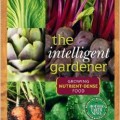Organic matter is the result of decomposition. Composted materials are organic matter. Humus is the stable endpoint of decomposition for organic material. Not a lot is known about humus, chemically. It is incredibly variable, so it’s hard to analyze. Basically it is the remaining resistant bits leftover after all of the easier to rot stuff has rotted. Humus is very stable and can remain in the soil for hundreds of years.
Organic matter is an important part of the soil. It prevents erosion, by aggregating particles of sand and clay; it increases water infiltration, builds pore space for water and air movement through soil, and facilitates seed germination, as well as eliminates crust formation. The most important benefit of organic matter, though, is its ability to hold the anionic plant elements:
- Sulfur (S)
- Phosphate (P2O4)
- Nitrate (NO3–)
- Borate (BO33-)
without organic matter holding on to these anions, they would just wash away, or get locked up and unavailable to the soil solution.
The ideal level of organic matter for all areas north of the Mason-Dixon Line is 7%. South of the Mason-Dixon Line should aim for 5%, although it’s very hard to get up over 4% there. A soil test will analyze the level of your organic matter: their number can reflect either stable humus or rapidly decaying organic matter, or both – both are essential.
The most compost that should be added at once is 1/2″ thick layer for building the level of organic matter. 1/4″ per year is enough to maintain a high level, once it has been reached.
Although it is incredibly beneficial and necessary, it is not the most important thing to focus on. Balancing the elements is more important.
Just a note on organic soils: I’ve seen literature on various desired levels of nutrients for different soil types, and Organic Soil is always mentioned, but never really knew what was meant by it. according to TIG, it is the soil that forms in swamps of peat and other preserved organic matter. It is rare and horticulturally valuable, if they are drained, but if it’s what you are starting with, it will be hard to amend. This is also called muck soil.


